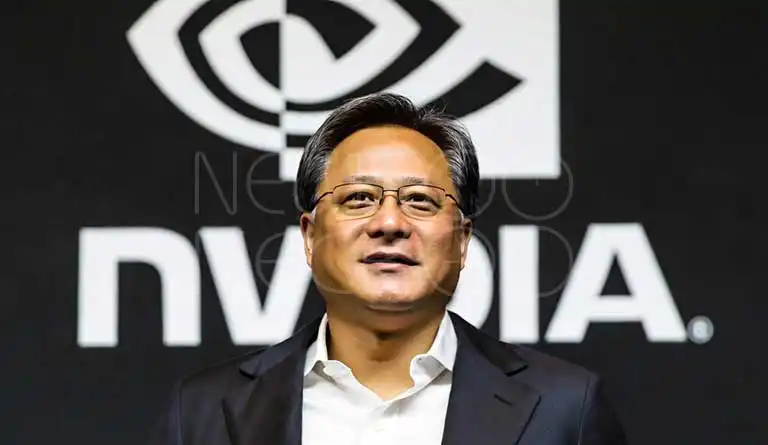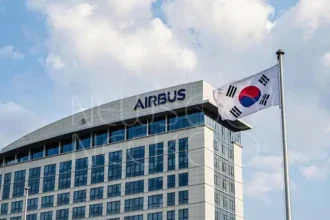Jensen Huang’s Shocking Warning About America Losing Tech Supremacy Gets Rapid Corporate Makeover
In the high-stakes world of artificial intelligence, where billions of dollars and national security hang in the balance, choosing your words carefully matters enormously. Jensen Huang, the charismatic chief executive of Nvidia and one of the most influential figures in technology, learned this lesson the hard way on Wednesday when a stark warning about China winning the AI race triggered what can only be described as a corporate panic and rapid damage control.
The drama unfolded at the Financial Times‘ Future of AI Summit, where Huang was speaking on the sidelines about the global competition in artificial intelligence. According to the British newspaper’s reporting, Huang delivered a bombshell assessment: “China is going to win the AI race.”
These seven words, coming from the leader of the company that manufactures the processors powering most of the world’s AI systems, would represent his starkest warning yet that America risks losing its technological leadership to its greatest geopolitical rival.
The Warning That Sparked Controversy
Huang reportedly explained his pessimistic view by pointing to specific advantages that China enjoys in the artificial intelligence competition. First, he highlighted China’s significantly lower energy costs compared to Western nations. Training advanced AI models requires massive amounts of electricity to power thousands of computer chips running continuously for weeks or months. When energy is cheaper, developing AI becomes more economically feasible.
Second, Huang pointed to what he described as looser regulations in China. While Western countries, particularly in Europe and increasingly in the United States, debate comprehensive rules governing AI development and deployment, China has moved more aggressively to both support and shape its domestic AI industry without the same level of public debate or regulatory caution.
The contrast Huang drew was striking. He was said to have voiced concern that the West, including the United States, is being restrained by “cynicism” and too much regulation. Meanwhile, China offers energy subsidies specifically designed to lower costs for local developers using domestically produced chips.
This is not abstract theorizing. Real money and real competitive advantages flow from these policy differences. If Chinese AI companies can train models for a fraction of the cost that American companies pay, and if they face fewer regulatory hurdles in deploying those models, the competitive implications could be profound.
The Rapid Retreat
But here is where the story takes an interesting turn. Within hours of the Financial Times publishing its report, Nvidia issued a notably different statement from Huang through an official company social media account.
“As I have long said, China is nanoseconds behind America in AI,” the revised statement read. “It’s vital that America wins by racing ahead and winning developers worldwide.”
Notice the dramatic shift in tone and message. The original reported comments suggested China would win the race. The official statement positioned China as currently behind America, while emphasizing the importance of the United States maintaining its lead.
The phrase “nanoseconds behind” is particularly interesting. A nanosecond is one billionth of a second—an almost incomprehensibly tiny amount of time. By using this metaphor, Huang acknowledges that China is extremely close to American capabilities while still technically trailing. This formulation allows him to sound competitive and optimistic rather than defeatist.
CNBC noted that it could not independently verify the original comments attributed to Huang by the Financial Times, adding another layer of uncertainty to the situation. Did Huang actually say China would win? Was he misquoted or taken out of context? Or did he say something he quickly regretted and needed to walk back?
You Might Read it: Jensen Huang Breaks the Rules with His China Strategy
The Business Context Behind the Words
To understand why this controversy matters so much, we need to examine Nvidia’s complicated relationship with China and American export restrictions.
Huang has consistently argued that the United States can maintain its AI leadership if developers worldwide remain dependent on Nvidia’s cutting-edge processors. This argument conveniently supports his company’s business interests while also making a genuine strategic point about technological ecosystems.
For years, Huang has lobbied against strict export restrictions that would prevent Nvidia from selling advanced chips to Chinese customers. His reasoning goes something like this: if America blocks Nvidia sales to China, Chinese companies will simply develop their own alternatives. Better to keep Chinese AI developers reliant on American technology, which provides both economic benefits and a degree of technological influence.
This lobbying appeared to bear fruit in July following meetings between Huang and President Donald Trump. Washington agreed to ease some chip export restrictions under a plan where Nvidia and its competitor AMD would pay the United States government fifteen percent of their Chinese revenues from sales of AI processors specifically tailored for that market.
For Nvidia, this represented a significant victory. China is an enormous market, and being able to sell even restricted versions of its chips there meant billions of dollars in potential revenue.
You Might Like it: Apple and Nvidia Stock Outlook: What Wall Street Is Saying
Beijing Slams the Door
But geopolitics rarely follows predictable scripts. Shortly after the American concessions, Beijing turned the tables in a move that caught many by surprise. Chinese authorities initiated a national security review of Nvidia’s chips and effectively shut the company out of the Chinese market entirely.
Huang has publicly stated that Nvidia’s market share in China has been reduced to zero a stunning reversal for a company that had been counting on Chinese sales as part of its growth strategy.
The reasons behind China’s decision remain somewhat murky. Is this genuine security concern about American-made chips in Chinese AI systems? Is Beijing using market access as leverage in broader trade negotiations with Washington? Are Chinese officials deliberately creating space for domestic chip manufacturers to grow without foreign competition?
Experts have speculated about all these possibilities. Some believe China is using Nvidia’s market access as a bargaining chip, hoping to extract concessions from the Trump administration on wider access to advanced semiconductors. Others think Beijing genuinely wants to force its technology sector to rely exclusively on domestically produced alternatives, even if those alternatives are currently inferior to Nvidia’s products.
The Failed Diplomatic Gambit
Huang’s predicament became even more complicated during Trump’s recent meeting with Chinese President Xi Jinping in South Korea. According to reporting by The Wall Street Journal, Trump had initially planned to discuss a request from Huang to allow sales of a new generation of AI chips to China.
This represented a potential breakthrough that could have reopened the Chinese market to Nvidia. However, top administration officials rallied against the idea. The Journal reported, citing anonymous current and former officials familiar with the matter, that these advisors convinced Trump not to make concessions on chip policy during the meeting.
The highly anticipated trade talks between Trump and Xi yielded no movement on semiconductor issues from either side. For Huang and Nvidia, this meant the door to the Chinese market remains firmly closed for the foreseeable future.
Shifting Strategy
With China off the table as a major market, Huang appears to be refocusing his attention and his advocacy. His comments at the Financial Times summit—whether accurately reported in their original form or better reflected in the subsequent official statement—suggest he is pivoting to different concerns.
If Nvidia cannot sell to China, then the company’s growth depends entirely on maintaining dominance in markets that remain open: the United States, Europe, and friendly Asian nations. This makes regulatory environment and energy costs in these regions even more critical to the company’s future.
Huang’s reported concerns about Western “cynicism” and “excessive regulation” take on new meaning in this context. If American and European regulators impose strict rules on AI development that slow innovation or increase costs, while China races ahead with government subsidies and lighter regulation, Nvidia’s accessible markets might fall behind technologically.
The energy cost issue is particularly pressing. AI training requires enormous amounts of electricity. Data centers full of Nvidia chips consume power at rates that strain local electrical grids. If energy costs in the West remain high while China subsidizes electricity for AI development, the economic advantage could tilt decisively toward Chinese companies even if they are using inferior domestically produced chips.
The Larger Implications
This episode reveals several important dynamics in the global AI competition.
First, even the most powerful technology executives must navigate extremely complex political terrain. Huang leads a company worth hundreds of billions of dollars and produces chips that are essentially irreplaceable in current AI development. Yet he cannot simply say what he thinks without considering diplomatic, political, and business ramifications.
Second, the U.S.-China technology competition is creating impossible choices for companies like Nvidia. American national security concerns demand restricting chip sales to China. But those restrictions push China to develop alternatives that could eventually compete with American products. Meanwhile, Nvidia loses revenue and influence.
Third, the competition between these technological superpowers extends beyond just chip manufacturing. It encompasses energy policy, regulatory philosophy, government subsidies, and fundamental approaches to innovation. Huang’s comments, in both their reported and official forms, highlight how these different elements interact to create competitive advantages or disadvantages.
What Comes Next
For Huang and Nvidia, the path forward remains uncertain. The Chinese market appears closed for now, potentially costing the company billions in annual revenue. American and European regulators continue debating how strictly to govern AI development. Energy costs remain high in most Western countries.
Whether Huang truly believes China will win the AI race, as the Financial Times reported, or merely thinks China is “nanoseconds behind,” as his official statement claimed, the underlying concern seems genuine. The competitive landscape is shifting, and outcomes that seemed certain just a few years ago now appear far less predictable.
One thing is clear: in the high-stakes world where artificial intelligence, geopolitics, and hundreds of billions of dollars intersect, every word matters. Jensen Huang learned that lesson on Wednesday, and the rapid evolution from pessimistic warning to optimistic rallying cry will likely be studied as a case example of corporate communication in the age of technological superpower competition.
Author: Yasir Khan
Date: 06 Nov, 2025
For More Updates, Visit Newsneck













